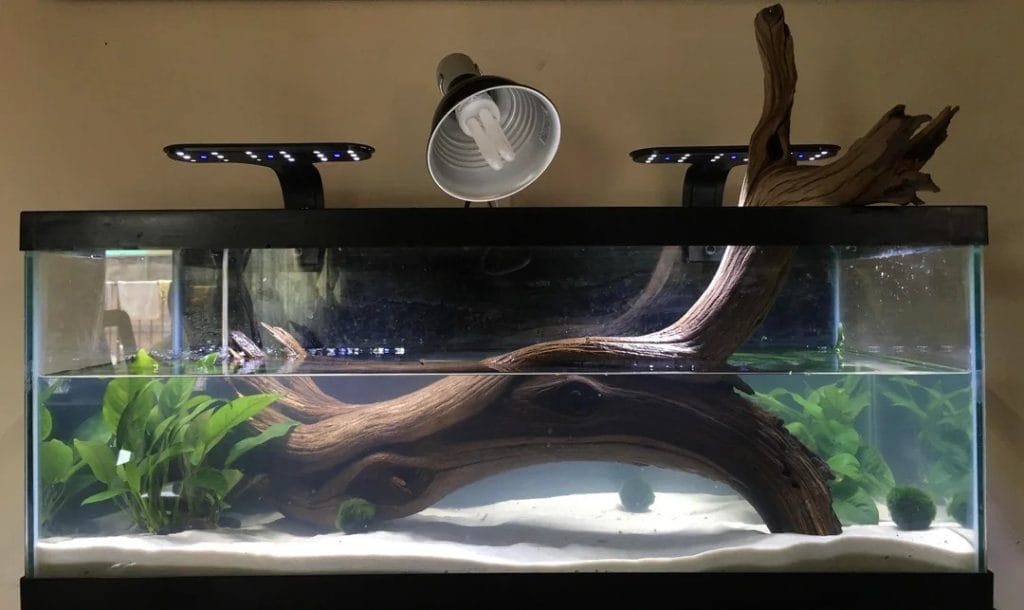Do Tortoises Need Water?

This post was created with help from AI tools and carefully reviewed by a human (Muntaseer Rahman). For more on how we use AI on this site, check out our Editorial Policy.
Recently, I read an article claiming that tortoises need no additional drinking water sources. These creatures can fulfill their fluid requirements from their vegetable and plant-based diet. Is this information accurate? Are tortoises really well off without any water?
In reality, the tortoises will become dehydrated even if they go 48 hours without water. It can cause health complexities like excessive weight loss, kidney failure, articulate gout, etc. Rehydrating the pets with water soaks and raising the humidity percentage is the way out of this misery.
Can dehydration in tortoises go extreme? Is tap water safe for these pets? Keep reading to get your answers.
Why Do Tortoises Need Water?
There is absolutely no way that tortoises can live without water. The creatures will fulfill their hydration requirement in one way or another. Otherwise, tortoises face brutal consequences. Such as,
1. Weight Loss
Dehydration can cause severe weight loss in tortoises. The creature looks skinny and boney. The nerve tissues also shrink, making the tortoise lose sensitivity in different body parts.
2. Weakness Takes Over
Tortoises low on water will also be low on the energy level. So, you will find the pets taking naps more frequently than before. In fact, they become so lethargic that they barely bask. As a consequence, there is always a health risk for these tortoises.
In the wild, the Greek tortoises and Hermann’s tortoises are most active after rainfall. Some researchers have spotted these species drinking water from streams, puddles, and the earth’s surface after the water shower.
3. Dry Skin & Shell
Dehydration can easily turn into an abnormal skin and shell shedding event for the tortoises. With the loss of water content, both the scutes and skin lose their elasticity and become flaky. Such unhealthy shedding raises the red flag for inflammation, infectious attack, and skin or shell rot.

4. Sunken Or Closed Eyes
Post-brumated tortoises often suffer from a shut or closed eye. The main reason behind this is dehydration. As the pets in hibernation barely drink, the thin film on their eyes dries off, introducing a shut-eye. This can occur to any dehydrated tortoise.
5. Health Complexities
Tortoises release their biological waste as urine and urate. But the lack of water turns the uric acid into a crystal aggregate, causing articulate gout. Consequently, tortoises may fall victim to kidney failure because of dehydration.
In short, tortoises need to drink water regularly to stay functional and healthy.
How To Make Your Tortoise Drink Water?
The previous section makes it clear that dehydration is never healthy for tortoises. A dehydrated tortoise exhibits the following signs,
- Sunken eyes
- Dry skin
- Flaky scutes
- Weight loss
- Loss of appetite
- Pale appearance
- Thick mouth mucus
- Lethargy, etc.
If you notice your pet showing any of the above symptoms, take immediate steps to rehydrate it. Some excellent tricks to get your tortoises to drink water are described below,
1. Accessible Water Reach
Tortoises can not swim, so they need no deep pool in the enclosure. Instead, a shallow water source is enough for the pets. Use a saucer bowl or a shallow container for this purpose.
Nevertheless, make sure the water source is accessible for the tortoises.
2. Soak Is Mandatory
Who says tortoises do not bathe? The truth is a regular soak acts as a crucial source of hydration for these reptiles. At the same time, bathing the tortoises in lukewarm water helps them excrement and pee. I have described the step-by-step process of soaking a tortoise in this article.
3. Regulate The Humidity
Increasing the moisture content in the enclosure contributes to keeping the tortoise hydrated. 2 popular ways of raising the humidity are, misting the substrate and installing a humidifier. Pen bedding must have a considerable water retention quality. So, select the substrate carefully.
4. A Water-Rich Diet
Sometimes, meals act as a significant way of rehydrating the tortoises. For example, cactus pads, cucumbers, iceberg lettuce, etc., are high in moisture. So, adding these items to the diet plan in an average quantity will help prevent dehydration in the pets.

This Hilarious Turtle Book Might Know Your Pet Better Than You Do
Let’s be real—most turtle care guides feel like reading a textbook written by a sleep-deprived zookeeper.
This one’s not that.
Told from the snarky point of view of a grumpy, judgmental turtle, 21 Turtle Truths You’ll Never Read in a Care Guide is packed with sarcasm, sass, and surprisingly useful insights.
And hey—you don’t have to commit to the whole thing just yet.
Grab 2 free truths from the ebook and get a taste of what your turtle really thinks about your setup, your food choices, and that weird plastic palm tree.
It’s funny, it’s honest, and if you’ve ever owned a turtle who glares at you like you’re the problem—you’ll feel seen.
How Much Water Do Tortoises Need?
Unfortunately, you can not measure the exact water requirement for tortoises. They drink whenever they feel thirsty. Owners have spotted their tortoises drinking water 2 – 7 times daily on average.
However, sometimes you may not catch your tortoise drinking water at all for days. The surroundings, food, and soaks are enough to hydrate the creature.
Let’s understand one thing. How much water the tortoise needs solely depends on the temperature and humidity percentage.
In scorching hot weather, the pet gets dehydrated sooner. But the scene is totally opposite in humid and moist weather.
In any scenario, do not take any risk. Make sure the tortoise has access to fresh water sources. Besides, regulating the humidity in the pen and soaking the tortoise regularly also contribute to fighting dehydration.
Can You Tell If The Tortoise Is Hydrated?
Do not worry about the hydration if the habitat includes an accessible water source and loose beddings. For assurance, look for the below characteristics in the tortoise,
- The eyes look bright and clear.
- Your pet is active and participates in every daily task.
- The skin and shell appear fresh, not too moist, and not too dry.
- During soaking, the tortoise disposes of the thick toothpaste-like substance as waste.
- The pet has bouncy skin.
Can A Tortoise Overdrink Water?
Surprisingly, a tortoise can overdrink water, which is an unhealthy phenomenon. Apparently, overdrinking may have adverse effects on kidney functions and blood circulation. Besides, the tortoises face some physical consequences too. Such as,
- Swelling: Drinking more water will only lead to water accumulation. So, you will notice your tortoise swell or bloat.
- Respiratory Sickness: Excessive humidity in the enclosure is often the reason behind the overhydration of the tortoise. It can cause cold-like diseases, for example, respiratory illness. Your pet will sneeze, wheeze, and cough as symptoms.
- Fatigue: Lethargy is a symptom of both overhydration and dehydration. As excess water works as a poison for the tortoise’s body, it will create more diseases. No wonder why the pet becomes so lazy.
- Soft Shell: Drinking water in an unnecessary amount can mess up the mineral balance in the tortoise system. As a result, the creature can experience soft shell issues.
- Diarrhea: Greens like cucumbers and iceberg lettuce are excellent water sources. But they are low in minerals. So, feeding the pets these items causes mineral deficiency and may lead to diarrhea.

Can Tortoises Drink Tap Water?
Yes and no! Yes, if the water chemistry is at a tolerable level for the tortoises. No, when the tap water contains high ammonia or chlorine.
Water chemistry changes with the region. So, you can not say for sure whether your area’s water is safe for the tortoise. Why not do a quick API test? The kits are available in the local pet stores.
But what is the safety range? Look at the table below for ideal water chemistry for tortoises. You have a green signal if tap water chemistry falls in this range.
| pH Level | 6 to 8 |
| Ammonia Level | 0 |
| Chlorine Level | 0 |
| Nitrate Level | ≤ 40 ppm |
| Nitrite Level | ≤ 0.5 ppm |
But avoid tap water at any cost if it contains the below elements,
- Volatile organic compounds
- Mercury
- Lead
- Limescale
- Fluorine
How Long Can Tortoises Go Without Water?
A tortoise can survive 1 week without drinking a single drop of water. But yes, this is only true for healthy tortoises. The timeline may stretch a day or two if the enclosure has a high humidity percentage.
Unfortunately, weak tortoises can not make it to 7 days without water. On top of that, if the pen temperature is high and humidity is low, the pets will be drained within 48 hours.
In any condition, your tortoises should not go without water for 2 days at a stretch. It raises a risk for severe health damage we have talked about earlier.
Well, some exceptions can be seen in desert tortoises and creatures native to arid areas. They barely have access to fresh water sources. Therefore, these tortoises depend on the surrounding humidity and water-rich foods for hydration.
But of course, do not compare your pet tortoises with the wild desert tortoises. Those creatures are well-adapted to the arid regions. For example, desert tortoises eliminate uric acid wastage using a lower water level.
These tortoises do not release vital body fluids unless they find a reliable source of hydration. Thus, in the rainy season, you will find these reptiles dispose of uric acid and urates in the average ratio.
Before You Go…
Some people claim that tortoises can live more than 3 years without food. I know the news sounds absurd, as these pets do require food regularly. I have illustrated facts on how long a tortoise can starve healthily and its consequences.
How Long Can A Tortoise Go Without Food?

About Author
Muntaseer Rahman started keeping pet turtles back in 2013. He also owns the largest Turtle & Tortoise Facebook community in Bangladesh. These days he is mostly active on Facebook.











